6 Unit1Grammar虚拟语气
- 格式:ppt
- 大小:1.85 MB
- 文档页数:27
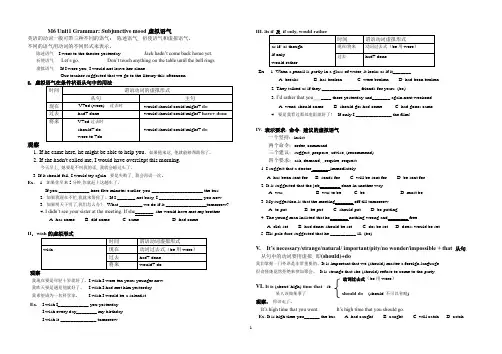
M6 Unit1 Grammar: Subjunctive mood 虚拟语气英语的动词一般可带三种不同的语气: 陈述语气, 祈使语气和虚拟语气。
不同的语气用动词的不同形式来表示。
陈述语气 I went to the theatre yesterday. Jack hadn’t come back home yet. 祈使语气 Let’s go. Don’t touch anything on the table until the bell rings . 虚拟语气 If I were you, I would not leave her alone.Our teacher suggested that we go to the library this afternoon.I.观察1. If he came here, he might be able to help you. 如果他来这, 他就能够帮助你了。
2. If she hadn't called me, I would have overslept this morning.今天早上, 她要是不叫我的话, 我就会睡过头了。
3. If it should fail, I would try again. 要是失败了, 我会再试一次。
Ex. 1. 如果你早来5分钟,你就赶上这趟车了。
If you ____________ here five minutes earlier, you ____________________ the bus. 2. 如果我现在不忙,我就来帮你了。
If I _______ not busy, I _________________ you now. 3. 如果明天下雪了,我们怎么办? What _________ we do if it ________________tomorrow? 4. I didn’t see your sister at the meeting. If she _______, she would have met my brother.A. has comeB. did comeC. cameD. had comeII .观察我现在要是年轻十岁就好了。
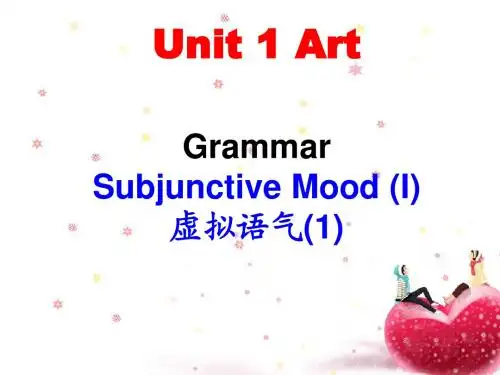
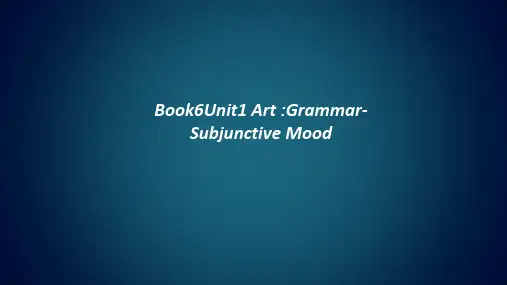
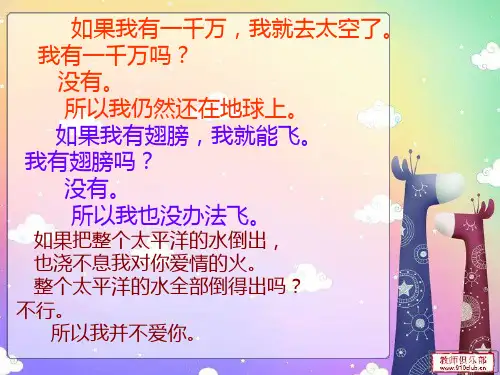
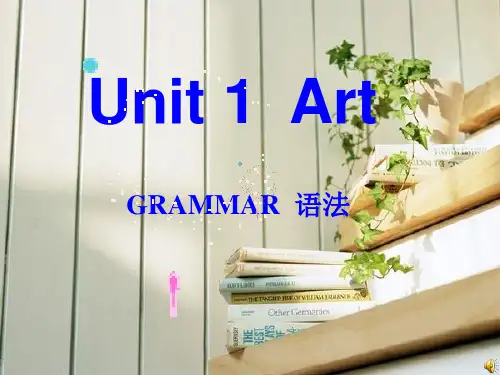
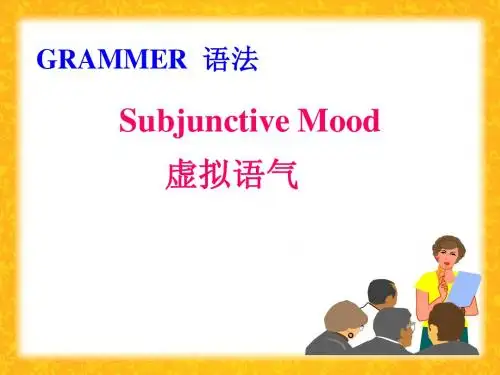
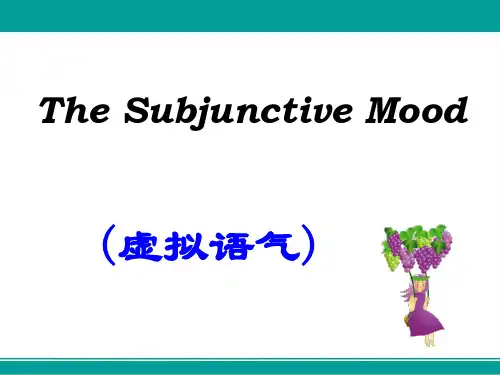
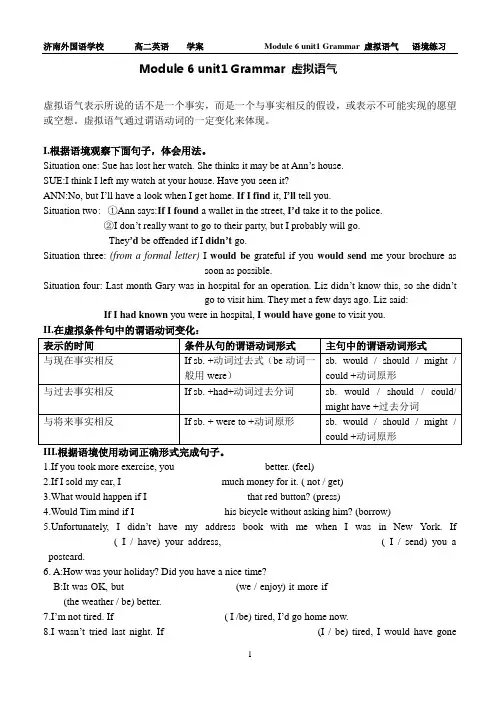
Module 6 unit1 Grammar 虚拟语气虚拟语气表示所说的话不是一个事实,而是一个与事实相反的假设,或表示不可能实现的愿望或空想。
虚拟语气通过谓语动词的一定变化来体现。
I.根据语境观察下面句子,体会用法。
Situation one: Sue has lost her watch. She thinks it may be at Ann’s house.SUE:I think I left my watch at your house. Have you seen it?ANN:No, but I’ll have a look when I get home. If I find it, I’ll tell you.Situation two: ①Ann says:If I found a wallet in the street, I’d take it to the police.②I don’t really want to go to their party, but I probably will go.They’d be offended if I didn’t go.Situation three: (from a formal letter) I would be grateful if you would send me your brochure assoon as possible.Situation four: Last month Gary was in hospital for an operation. Liz didn’t know this, so she didn’tgo to visit him. They met a few days ago. Liz said:If I had known you were in hospital, I would have gone to visit you.1.If you took more exercise, you _________________ better. (feel)2.If I sold my car, I ___________________ much money for it. ( not / get)3.What would happen if I ___________________ that red button? (press)4.Would Tim mind if I _________________ his bicycle without asking him? (borrow)5.Unfortunately, I didn’t have my address book with me when I was in New York. If _____________( I / have) your address, ______________________________ ( I / send) you a postcard.6. A:How was your holiday? Did you have a nice time?B:It was OK, but _____________________ (we / enjoy) it more if _________________________ (the weather / be) better.7.I’m not tired. If _____________________ ( I /be) tired, I’d go home now.8.I wasn’t tried last night. If _____________________________ (I / be) tired, I would have gonehome earlier.9.I’m sure Amy will lend you the money. I’d be very surprised if she _______________________(refuse).10.I’d go out if it _________________ raining. ( not / be)IV.观察每组图片,假设你处于该情境中,用if写出你应说的话。
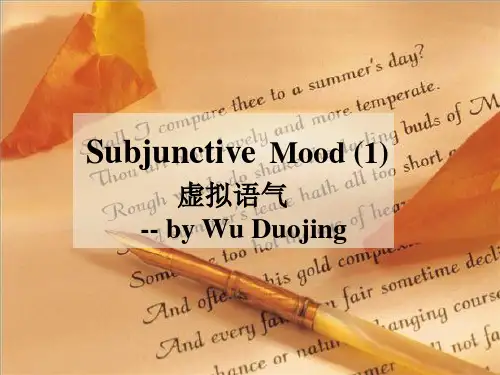
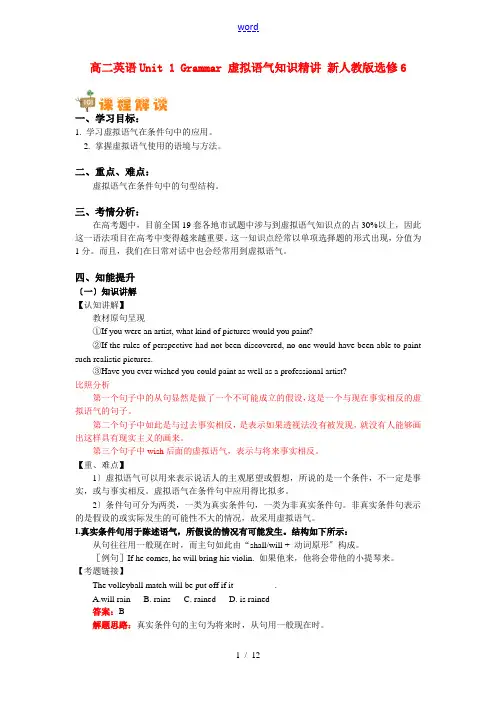
高二英语Unit 1 Grammar 虚拟语气知识精讲新人教版选修6一、学习目标:1. 学习虚拟语气在条件句中的应用。
2. 掌握虚拟语气使用的语境与方法。
二、重点、难点:虚拟语气在条件句中的句型结构。
三、考情分析:在高考题中,目前全国19套各地市试题中涉与到虚拟语气知识点的占30%以上,因此这一语法项目在高考中变得越来越重要。
这一知识点经常以单项选择题的形式出现,分值为1分。
而且,我们在日常对话中也会经常用到虚拟语气。
四、知能提升〔一〕知识讲解【认知讲解】教材原句呈现①If you were an artist, what kind of pictures would you paint?②If the rules of perspective had not been discovered, no one would have been able to paint such realistic pictures.③Have you ever wished you could paint as well as a professional artist?比照分析第一个句子中的从句显然是做了一个不可能成立的假设,这是一个与现在事实相反的虚拟语气的句子。
第二个句子中如此是与过去事实相反,是表示如果透视法没有被发现,就没有人能够画出这样具有现实主义的画来。
第三个句子中wish后面的虚拟语气,表示与将来事实相反。
【重、难点】1〕虚拟语气可以用来表示说话人的主观愿望或假想,所说的是一个条件,不一定是事实,或与事实相反。
虚拟语气在条件句中应用得比拟多。
2〕条件句可分为两类,一类为真实条件句,一类为非真实条件句。
非真实条件句表示的是假设的或实际发生的可能性不大的情况,故采用虚拟语气。
I.真实条件句用于陈述语气,所假设的情况有可能发生。
结构如下所示:从句往往用一般现在时,而主句如此由“shall/will + 动词原形〞构成。
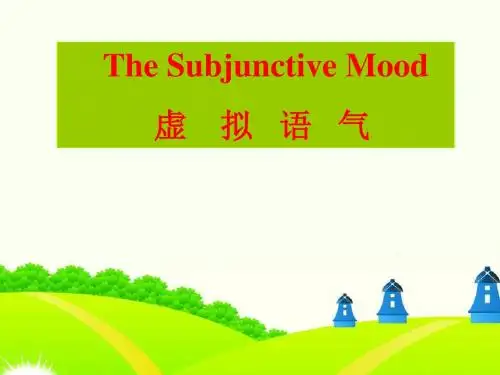
高中英语学习资料madeofjingetiejiGRAMMAR虚构语气(上)【概括】虚构语气用来表示说话人所说的话不是事实,而是一种假定、梦想、思疑或推断。
虚构语气主要用于条件状语从句、方式状语从句和名词性从句中。
一、虚构语气在条件从句中的用法:1 .与此刻事实相反:从句的谓语用动词的过去式,主句的谓语用would/should/could/might+动词原形。
注意:be的过去式往常用were。
如:IfIknewhernumber,Icouldringherup.IfHelenwereherenow,howniceitwouldbe!2.与过去事实相反:从句的谓语用had+过去分词,主句的谓语用would/should/could/ might+过去分词。
如:Ifhehadtakenyouradvice,hewouldn’thavemadesuchabadmistake.3 .与未来可能状况相反或实现可能性不大:从句的谓语能够用动词的过去式,也可用wereto/should+动词原形,主句的谓语用would/should/could/might+动词原形。
注意:be的过去式往常用were。
如:Ifyoulivedthereforawhile,youwouldchangeyourmindaboutthatplace.Ifhewereto/shouldbegivenanotherchance,hecouldcertainlydoamuchbetterjob.注意:虚构条件句谓语中有should/were/had时,可将if省略,而将should/were/had提前。
如:Wereitnotfortheirhelp,wewouldbeinserioustrouble.Hadwestartedabitearlier,wewouldnothavemissedthetrain.ShouldheleaveforParistoday,hecouldgettherebyFriday.二、虚构语气在wish的宾语从句中的用法:在wish后的宾语从句中,谓语用法以下:1.表示此刻不可以实现的梦想,从句的谓语用动词过去式。
人教版高二英语第六模块Unit1 Grammar虚拟语气Collected by Bruce Lee Teaching Aims & Demands虚拟语气部分主要考查情态动词的选择、虚拟语气在条件句中、在名词性从句中、在简单句中或在日常交际中的使用等基本用法。
Teaching Important & Difficult Points:If 虚拟条件句和含蓄条件句的用法;wish宾从用法;would rather的用法;should+动词原形Teaching Procedures & Ways【Section1. Observations】1. If you could have three of these paintings on the walls for your classroom, which would you choose?2. If you were an artist, what kind of pictures would you like to paint?3. If the rules of perspective had not been discovered, no one would have been able to paint such realistic pictures.4. Without the new paints and new technique, we would not be able to see the many great masterpieces for which this period is famous. (=If there were no new paints and new technique, )【Section2. Self-study and Exploration】虚拟语气是一种特殊的动词形式,说话人陈述的并不是事实,而是表达一种愿望、假设和猜测等。
高二英语YYG2-xuan6-U1《Unit1 Art Grammar : The Subjunctive Mood》导学案【学习目标】1.会使用if 条件句中虚拟语气句式2. 能使用虚拟语气的几种特殊句式造句【重点难点】条件句中虚拟语气句式【学法指导】通过例句归纳总结几种虚拟语气的运用情况;通过练习巩固虚拟语气的用法。
【知识链接】1.英语中的语气分:陈述语气、祈使语气和虚拟语气三类。
陈述语气用来陈述事实或可能发生的事;祈使语气用来提出请求、发出命令、警告、威胁或叮嘱等;虚拟语气用来表示虚假的、与事实相反的或难以实现的情况,或表示主观愿望及某种强烈情感。
2. 条件状语从句分类条件句可分为两类,一类为真实条件句,一类为非真实条件句。
非真实条件句表示的是假设或实际可能性不大的情况,故采用虚拟语气。
【学习过程】观察下列句子1. If he doesn't hurry up,he will miss the bus.2.If he is free,he will ask me to tell stories.3.If I were you,I would go at once.4.If there were no air,people would die.以上四句中_______ 和_______ 是真实语气;_______ 和______ 是虚拟语气【自主探究】一、状语从句中的虚拟语气(一) if 引导的条件状语从句1 If I had time, I would attend the meeting.2. If I were you, I should seize the opportunity to go abroad.3. If you had taken my advice, you would not have failed in the exams.4. If he had come earlier, he wouldn’t have missed the first bus.5 If the headmaster came tomorrow, we would have the meeting.6 If it were to rain tomorrow, the sports meeting would be put off.7 If he should make a mistake, you should not blame him.与现在事实相___________与过去事实相反__________ 与将来事实相反___________感悟:与现在事实相反If条件句结构___________________________主句结构_____________________________ practice1. If I ________ you, I would go by plane. Flying is much faster.A. beB. wasC. wereD. am2. I do not think those people are really English. If they were, they ________ speak with French accents.A. don'tB. will notC. mustn'tD. wouldn't3. If I ___ ten years younger, I ______ very happy.A. were, would beB. am, shall beC. were, shall beD. am, would be感悟:与过去事实相反If条件句结构___________________________主句结构_____________________________practice1. If the farmer hadn’t seen the snake, he _______________ (not put) it in the arms.2. If he ______________ (not put) it in the arms, the snake wouldn’t have bitten him.3. If the snake _______________ (not bite) him, he________________ (not die).4.If my lawyer ___________(not be here ) last Saturday , he ______(prevent ) me from going . 感悟:与将来事实相反If条件句结构___________________________主句结构_____________________________Practice1.If everyone ________ (help) those in need in future, the world would be a much better place.2. If it _________ (be) fine this weekend, we would have a picnic.3. If I ________(be admit to) a famous university in two years, I would treat you to a big meal.4. If it _____________(snow) tomorrow, we would go skiing.二):条件状语的倒装:如果条件状语中有were, had, should时, 可以倒装成:Were / Should / Had +主+其他1. If I were you, I would try it again. ___________________, I would try it again.2. If he had been there yesterday, he would have seen the film._______________ there yesterday, he would have seen the film.3. If it should snow tomorrow, we wouldn’t go out. _____________ tomorrow, we wouldn’t go out.(三).错综时间条件句:假设条件从句谓语动词发生的时间与主句所假设的谓语动词不一致,叫做错综条件虚拟语气。